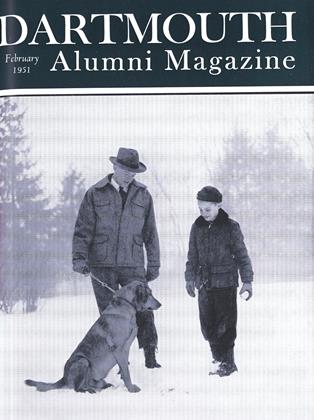IF students have been in the dark about what is in store for them, neither has the College known what problems it may be called upon to face in the months ahead. In order to be geared for quick action when it is called for, the Faculty and Trustees last month voted approval of a College Committee on Emergency Adjustments, similar in powers and responsibilities to the 1941 Committee 011 Defense Instruction.
As proposed by the Faculty Council, and approved by vote of the full faculty at a special meeting on January 17, the Committee on Emergency Adjustments is authorized "(1) to adjust the academic programs and credits of individual students, including requirements for the degree; (2) to plan and, if necessary, to put into operation an accelerated program; (3) to adjust the curriculum to meet the requirements of military training or government-sponsored programs that the College may undertake, and to assign staff for such purposes; and (4) to recommend and, with the approval of the Faculty Council, to make other adjustments in programs of the College." The Committee will report periodically to the Faculty Council, representative of the full faculty, and will have its status reviewed at the end of two years.
President Dickey is chairman of this allimportant Committee and Anton A. Raven, Professor of English, is co-chairman. Other members are Lloyd K. Neidlinger '23, Dean of the College; Donald H. Morrison, Dean of the Faculty; Royal C. Nemiah, Lawrence Professor of the Greek Language and Literature: Earl R. Sikes, Professor of Economics; George F. Theriault '33, Assistant Professor of Sociology; Leslie F. Murch, Professor of Physics; and Robin Robinson '24, Professor of Mathematics.
One of the first questions the Committee on Emergency Adjustments will tackle is whether Dartmouth should adopt an accelerated, three-term year, as it did at the outset of the last war. The argument for an extra summer semester is that, if 18-year-olds are drafted but are deferred until the end of an academic year, it will enable freshmen to matriculate earlier and to complete at least one year of college; and also that it will enable some men now enrolled to speed up the completion of two years of college, required for most officer candidate programs in the armed forces.
 View Full Issue
View Full Issue
More From This Issue
-
 Article
ArticleThe Student Days of Richard Hovey
February 1951 By EDWARD C. LATHEM '51 -
 Class Notes
Class Notes1929
February 1951 By F. WILLIAM ANDRES, EDWIN C. CHINLUND, JACK D. GUNTHER -
 Article
ArticleSIGHTED and SUNK
February 1951 By JOHN HURD '21 -
 Class Notes
Class Notes1918
February 1951 By ERNEST H. EARLEY, DONALD L. BARR, DAVID L. GARRATT -
 Class Notes
Class Notes1933
February 1951 By GEORGE F. THERIAULT, LEE W. ECKELS -
 Class Notes
Class Notes1905
February 1951 By GEORGE W. PUTNAM, GILBERT H. FALL
C. E. W.
-
 Article
ArticleNo Ivory Tower on Costs Either
June 1946 By C. E. W. -
 Article
ArticleE. Gordon Bill
January 1948 By C. E. W. -
 Article
ArticleConcerning Popcorn
February 1950 By C. E. W. -
 Article
ArticleMiscellany
January 1951 By C. E. W. -
 Article
ArticleLibrary Growth
March 1951 By C. E. W. -
 Article
ArticleA Wah Hoo Wah!
November 1953 By C. E. W.
Article
-
 Article
ArticleA WAH-HOO-WAH!
January 1937 -
 Article
ArticleBack to the Track
APRIL 1968 -
 Article
ArticleBriefly Noted
MAY 1968 -
 Article
ArticleHANOVER'S EARLY BIRDS
December 1961 By ALLEN R. FOLEY '20 -
 Article
ArticleSeattle
MARCH 1969 By THOMAS B. RUSSELL '61 -
 Article
ArticlePHYSICAL FITNESS WORK AT DARTMOUTH 1925-26
DECEMBER 1926 By William R. P. Emerson, M. D.

